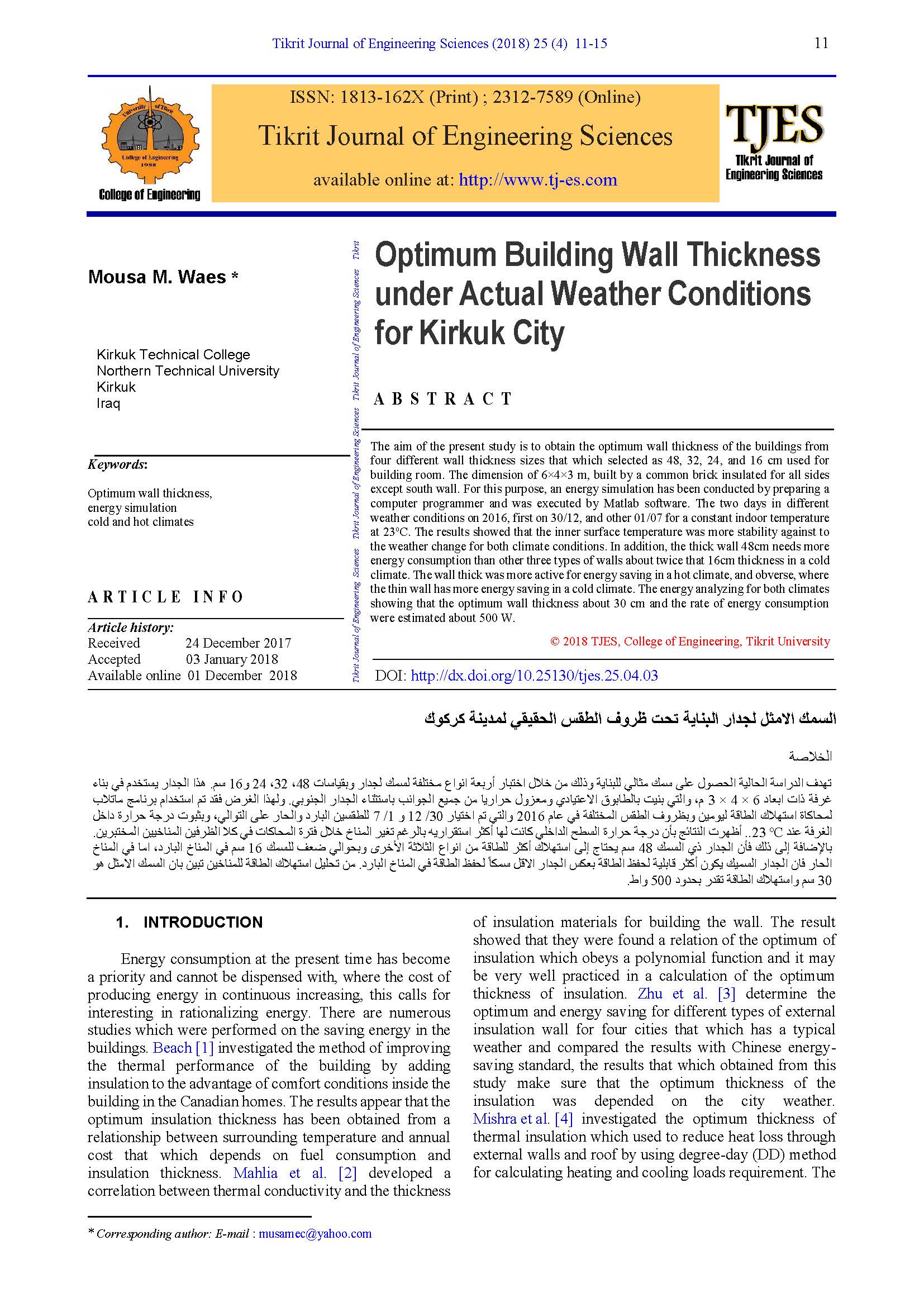السمك الامثل لجدار البناية تحت ظروف الطقس الحقيقي لمدينة كركوك
محتوى المقالة الرئيسي
الملخص
تهدف الدراسة الحالية الحصول على سمك مثالي للبناية وذلك من خلال اختبار أربعة انواع مختلفة لسمك لجدار وبقياسات 48 ، 32 ، 24 و 16 سم. هذا الجدار يستخدم في بناء
غرفة ذات ابعاد 6 × 4 × 3 م، والتي بنيت بالطابوق الاعتيادي ومعزول حراريا من جميع الجوانب باستثناء الجدار الجنوبي. ولهذا الغرض فقد تم استخدام برنامج ماتلاب
لمحاكاة استهلاك الطاقة ليومين وبظروف الطقس المختلفة في عام 2016 والتي تم اختيار 30 / 12 و 1 / 7 للطقسين البارد والحار على التوالي، وبثبوت درجة حرارة داخل
الغرفة عند 23 oC.. أظهرت النتائج بأن درجة حرارة السطح الداخلي كانت لها أكثر استقراريه بالرغم تغير المناخ خلال فترة المحاكات في كلا الظرفين المناخيين المختبرين.
بالإضافة إلى ذلك فأن الجدار ذي السمك 48 سم يحتاج إلى استهلاك أكثر للطاقة من انواع الثلاثة الأخرى وبحوالي ضعف للسمك 16 سم في المناخ البارد، اما في المناخ
الحار فان الجدار السميك يكون أكثر قابلية لحفظ الطاقة بعكس الجدار الاقل سمكا لحفظ الطاقة في المناخ البارد. من تحليل استهلاك الطاقة للمناخين تبين بان السمك الامثل هو
30 سم واستهلاك الطاقة تقدر بحدود 500 واط.
تفاصيل المقالة
القسم

هذا العمل مرخص بموجب Creative Commons Attribution 4.0 International License.
THIS IS AN OPEN ACCESS ARTICLE UNDER THE CC BY LICENSE http://creativecommons.org/licenses/by/4.0/
المراجع
Beach RK. Determining the optimum thickness of insulation for heated buildings. Technical Paper, National Research Council Canada. Division of Building Research 1965; 5: 1-10.
Mahlia TMI, Taufiq BN, Masjuki HH. Correlation between thermal conductivity and the thickness of selected insulation materials for building wall. Energy and Building 2007; 39: 182-187.
Zhu P, Huckemann V, Fisch MN. The optimum thickness and energy saving potential of external wall insulation in different climate zones of China. Procedia Engineering 2011; 21: 608-616.
Mirsha S, Usmani JA, Varshney S. Optimum insulation thickness of external walls and roof for different degree-day region. International Journal of Engineering Research and Technology 2012; 1(7): 1-8.
Fertelli A. Determination of optimum insulation thickness for different building walls in Turkey. Transitions of Famina 2013; XXXVII-2: 103-113.
Basrawi F, Ibrahim H, Lee GC. Optimum thickness of wall insulation and their thermal performance for building in Malaysia climate. International Journal of Automotive and Mechanical Engineering 2013; 8: 1207-1217.
Nyers J, Tomic S, Nyers A. Economic optimum of thermal insulation layer for external wall of brick. Acta Polytechnica Hungarica 2014; 11(11): 209-222.
Kaynakali O, Canbolat AS, Saka K, Yamankaradeniz R. Optimization of insulation thickness for external walls considering deferent climatic conditions. Proceedings of The IRES International Conference 2017 Feb 1-2; Dubai, UAE: p.1-5.
Holman JP. Heat transfer, 10th ed., New York: McGraw-Hill, Higher Education; 2010.
Abbas EF. Comparative study of thermal performance for various heating systems which are acting passively. Ms.C. Thesis, University of Technology; Baghdad, Iraq: 1999.





